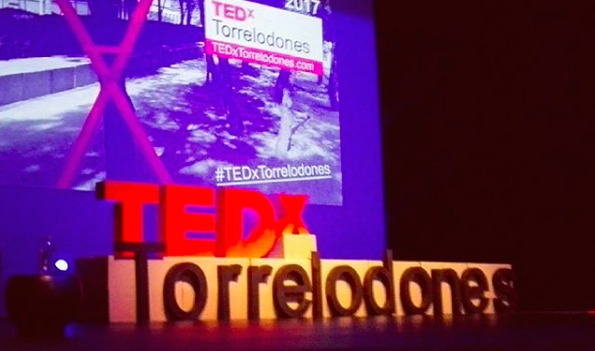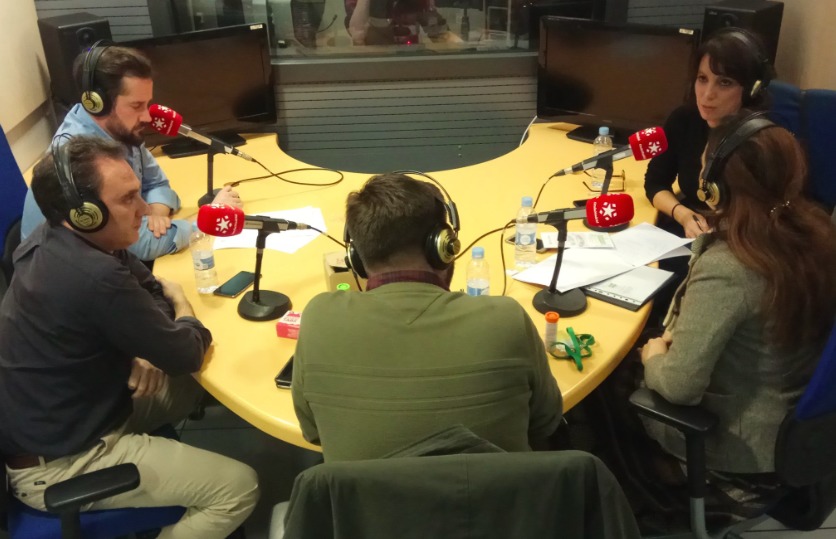Tu voz en situaciones de estrés // Your voice during stress experiences (Esp & Eng)

“La voz humana es el más bello instrumento, pero también el más difícil de tocar”
“Human voice is the most beautiful instrument, but also the most difficult to play”
Richard Strauss
¿Qué ocurre en nuestro cuerpo cuando vivimos situaciones de estrés? ¿Y cómo afecta un puntual exceso de cortisol, la hormona del estrés, a nuestra voz?
La primera clave fundamental para que tu voz transmita y llegue a tu público es una corporalidad adecuada y coherente al sentimiento que quieres transmitir. Vamos a empezar hablando del cuerpo porque el cuerpo es el trampolín desde el cual salta y se impulsa tu voz.
Cuando he tenido que enfrentarme a una situación nueva, a una situación que no controlaba, la reacción natural y lógica de mi cuerpo ha sido la contracción, y por lo tanto la tensión en las partes más involucradas en la acción que fuera. De hecho el origen etimológico de la palabra “Estrés” es el término latino “Strictus”, participio de “Stringere”, y que significa apretar, estrechar.
Pues bien, la finalidad de este post es precisamente todo lo contrario, soltar y expandir.
Recuerdo por ejemplo la primera vez que tuve que afrontar una conferencia en un auditorio para unas 180 personas y los esfuerzos que tuve que hacer para mantenerme físicamente relajada, para que esa tensión corporal que tenía (natural por otra parte por la inseguridad que me provocaba esa situación nueva) no afectara a la calidad de mi voz o a la sensación que yo quería transmitir a mi audiencia.
Cuando vayas a hacer una exposición pública (y esto incluye desde una entrevista de trabajo con una persona, hasta una conferencia en un auditorio para 500 oyentes) es importantísimo prestar atención a tu cuerpo, a lo que sucede dentro de tu cuerpo. Hay toda una serie de métodos para relajarnos en situaciones de mucho estrés que nos pueden ayudar de una manera general, pero yo me voy a focalizar en conseguir que relajes aquellos músculos que afectan al aparato fonador y que por lo tanto pueden afectar a la calidad de tu voz y a la emisión de aire necesaria para que tu voz suene de manera potente.
1. Empecemos hablando de los hombros. Es vital tener los hombros relajados porque son la primera pieza de un dominó que irá cayendo si no conseguimos relajarlos. Para ello es conveniente botar con los hombros, como si fueras un muñeco de goma, botando por toda la estancia o en el pequeño espacio donde te encuentres. Las partes de nuestro cuerpo no son departamentos estancos, y la relajación del resto del cuerpo también te ayudará de una manera general, así que aprovecha para hacer unos estiramientos y mueve tus brazos como si estuvieras nadando.
2. El cuello. Conviene hacer algunos ejercicios de calentamiento y liberación del cuello antes de una exposición oral. Date un masaje por la parte de detrás del cuello, por todos los músculos que soportan el peso de nuestra cabeza. Es ciertamente sorprendente cómo el calentamiento del cuello afecta de manera positiva a la calidad de nuestra voz. Cuando voy a hacer una grabación hago unos ejercicios de calentamiento, unas rotaciones del cuello y una vez liberados los músculos que afectan a esta zona es llamativo cómo la voz suena radicalmente distinta.
3. La mandíbula y la lengua. La articulación temporo-mandibular une los huesos de la mandíbula con el cráneo, y es una de las más utilizadas en nuestro cuerpo porque la usamos para masticar, para tragar, bostezar, y por supuesto para hablar. En el caso de los mamíferos depredadores, el estrés mandibular está asociado a la supervivencia. La lengua es un conjunto de nueve músculos que reúne a los más fuertes del cuerpo. Te invito a ser consciente a lo largo del día del estado en el que se encuentran tanto tu mandíbula como tu lengua. Cuantas más veces lo hagas al día, mejor. Simplemente chequea en qué estado se encuentran, si están relajadas o tensas, y aprovecha para darte un pequeño masaje en todo el conjunto de músculos que tenemos alrededor de las mandíbulas.
4. Bostezar es uno de las mejores ejercicios para calentar los músculos que intervienen en la fonación. Te confieso que antes de entrar en un estudio de grabación siempre voy al aseo más cercano y me hago mis cuatro o cinco bostezos amplios y sonoros (en la medida que puedan serlo) para calentar todos los músculos que voy a utilizar al realizar la locución.
Así que resumiendo, ten claras las partes que conviene tener relajadas a la hora de hacer una presentación en tu trabajo, dar una ponencia, acudir a una entrevista personal,… Estos ejercicios te van a ayudar a que la energía fluya por tu cuerpo y no se quede estancada en una zona que seguramente necesitarás tener liberada para poder ser tú mismo y evitar que los nervios o la tensión te jueguen una mala pasada.
Recuerda: hombros, cuello, mandíbula y lengua, todo muy relajadito. Y aunque no afecta de manera física al aparato fonador, sí te recomiendo que revises de vez en cuando el estado de tu frente, en especial del entrecejo. Tener relajada toda la zona de la frente y el entrecejo te va a ayudar muchísimo a ti, y por lo tanto a tu voz.
Otro día hablaremos de la respiración, que merece consideración aparte.
Recuerda que tu voz es el reflejo de tu interior.
————————————————————————————
What happens in our bodies when we live in stressful situations? And how does a point excess cortisol, the stress hormone, affect to our voice?
The first key to your voice forward and reach your public is appropriate and consistent physicality to the feeling you want to convey. Let's start talking about the body because the body is the springboard from which your voice will jump and prompt.
When I had to face a new situation, a situation which was not controlled, the natural and logical reaction of my body has been shrinking, and therefore the tension in the parts most involved in whatever action was. In fact, the etymological origin of the word "stress" is the Latin word “Strictus", participle “stringere", and that means squeezing, tightening.
Well, the purpose of this post is just the opposite, loosen and expand.
I remember for example the first time I faced a lecture at an auditorium for 180 people and the efforts I had to do to keep myself physically relaxed, so that the body tension that I had (natural on the other hand by the insecurity caused me that new situation) didn't affect the quality of my voice or the feeling I wanted to convey to my audience.
When you go to make a public exhibition (and this includes everything from a job interview with just a person, to a conference in an auditorium for 500 listeners) it is important to pay attention to your body, what happens inside your body. There are a number of ways to relax in stressful situations that can help us in a general way, but I'm going to focus on getting relax those muscles that affect the vocal apparatus and therefore can affect the quality of our voice and the emission of air necessary for your voice sound powerfully.
1. Let’s start talking about the shoulders. It is vital to keep your shoulders relaxed because they are the first piece of a domino that will fall if we do not relax. It is convenient to bounce shoulders, as if you were a rubber doll, bouncing around the room or in the little space you are. The parts of our body are not watertight, and relaxation of the rest of the body also will help in a general way, so take the opportunity to do some stretching and move your arms as if you were swimming.
2. The neck. It is convenient to warm up and release the neck before an oral presentation. Give yourself a massage for the back part of the neck, all the muscles that support the weight of your head. It is certainly surprising how heating the neck affects positively the quality of our voice. When I have to make a record I do some warm up exercises, several rotations of the neck and once released the muscles that affect this area is amazing how the voice sounds radically different.
3. Jaw and tongue. The temporomandibular joint connects the bones of the jaw to the skull, and is one of the most used in our body that we use for chewing, swallowing, yawning, and of course for speaking. In the case of mammalian predators, the mandibular stress is associated with survival. Tongue is a set of nine muscles that brings together the strongest in the body. I invite you to be aware throughout the day of the state in which they are both your jaw and your tongue. The more times a day you do it, better for you. Just check the state they are, if they are relaxed or tense, and try to give a little massage on the entire set of muscles we have around the jaws.
4. Yawning is one of the best exercises to warm up the muscles involved in phonation. I confess that before entering a recording studio always go to the nearest toilet and I do four or five large and sonorous yawns (insofar as they can be) to heat all the muscles that I will use to do the recording.
So in short, be clear about the parts that should be relaxed when making a presentation at work, give a conference, attend a personal interview,… These exercises will go to help the energy flow through your body and not stay it stuck in an area that certainly need to be liberated to be yourself and avoid the nerves or tension play tricks on you.
Remember: shoulders, neck, jaw and tongue, all very relax. And although it does not affect the vocal apparatus in a physical way, I'll also recommend that you review from time to time the state of your forehead, especially the frown muscle. Having relaxed the whole area of the forehead and eyebrows will greatly help you, and therefore will improve your voice.
Another day we will talk about breathing, which deserves separate consideration.
Remember that your voice is the reflection of your interior.
(Sorry, I couldn't find this absolutely wonderful video in English)
Artículos de Mamen 🐝 Delgado
Ver blog
¡Mis queridas abejitas! · Muchos de vosotr@s ya sabéis que estoy en el equipo organizador de TEDxTo ...

Este pasado 6 de enero tuve la grandísima suerte de participar en el programa Emprende Madrid de Ond ...

MAMEN · ¡Muy buenas Juan Ramón! Muchísimas gracias por acercarte a este espacio virtual y charlar co ...
Profesionales relacionados
Puede que te interesen estos puestos de trabajo
-

Preparador /a de pedidos picking voice
Encontrado en: Eurofirms ES CD - hace 1 semana
Eurofirms AMOREBIETA, España¿Tienes experiencia en el sector logístico? ¿Has estado trabajando en preparación de pedidos? Si tienes experiencia con sistemas de picking y disponibilidad para trabajar en Bizkaia, esta es tu oportunidad · Desde Eurofirms buscamos incorporar un/a preparador/a de pedidos con pic ...
-
Aerostructure Stress Engineer
Encontrado en: Buscojobs ES C2 - hace 1 día
Empresa Líder Madrid, EspañaTe estamos esperando¿Quiénes somos?Somos Capgemini Engineering, una marca que forma parte del Grupo Capgemini.Líderes en servicios de ingeniería e I+D, con más de personas dedicadas a la Ingeniería y la Ciencia en todo el mundo. Ayudamos a nuestros clientes a acelerar su camino h ...
-
OPERADOR/A DE CÁMARA ENG EN CHIP AUDIOVISUAL para Huesca, Madrid, Teruel y Zaragoza(temporal) vacaciones 2024
Encontrado en: Talent ES C2 - hace 3 días
Henneo Zaragoza, España De jornada completaBuscamos personas con el GRADO SUPERIOR en ILUMINACIÓN, CAPTACIÓN Y TRATAMIENTO DE LA IMAGEN o REALIZACIÓN DE PROYECTOS AUDIOVISUALES Y ESPECTÁCULOS que residan en Huesca, Madrid, Teruel y Zaragoza, para contratos temporales. · Las tareas de la posición serán: · Grabación y capta ...



Comentarios
Mamen 🐝 Delgado
hace 7 años #6
Retomaré los temas de voz y presencia escénica, que al fin y al cabo son mi especialidad. beBee me está enseñando muchísimo Javier, y es un auténtico lujo poder participar en conversaciones tan globales como las que aquí se desarrollan. Un lujo y unas risas...
Mamen 🐝 Delgado
hace 7 años #5
Y gracias por compartirlo!! No me había dado cuenta...
Mamen 🐝 Delgado
hace 7 años #4
Muchas gracias Anycka HC!!! Me alegro de que te sea útil, esa es la mejor recompensa. Feliz sábado!!
Mamen 🐝 Delgado
hace 8 años #3
Me acabas de dar una idea buenísima para enfocar el siguiente post Javier C\u00e1mara Rica. Un gustazo habernos encontrado en esta inmensidad de unos y ceros!! ;)
Mamen 🐝 Delgado
hace 8 años #2
Gracias Antonio Alfonso Hern\u00e1ndez Mateo, qué alegría "verte" por aquí!! ;)
Javier Cámara-Rica 🐝🇪🇸
hace 8 años #1